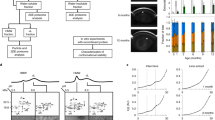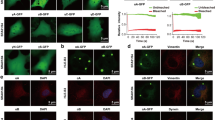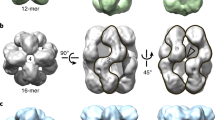Abstract
THE biochemical basis for the phenomenon termed ‘cold cataract’ (that is, opacification of lenses due to cooling) has been elucidated. A soluble protein which comprises approximately 10 per cent of the total soluble lens protein and which precipitates both in lenses and in aqueous extracts of lenses when they are cooled below 10° C has been isolated. This finding validates the suggestion made by van Heyningen1 that a protein is responsible for clouding of mammalian lenses in the cold. It has been further observed that cold precipitation is a reversible process, since warming the lenses or extracts results in complete restoration of their transparency.
This is a preview of subscription content, access via your institution
Access options
Subscribe to this journal
Receive 51 print issues and online access
$199.00 per year
only $3.90 per issue
Buy this article
- Purchase on Springer Link
- Instant access to full article PDF
Prices may be subject to local taxes which are calculated during checkout
Similar content being viewed by others
References
van Heyningen, R., in The Eye, edit. by Davson. H., 1 (Academic Press, N. Y., 1962).
Sheraga, H. A., Nemethy, G., and Steinberg, I. Z., J. Biol. Chem., 237, 2706 (1962).
Author information
Authors and Affiliations
Rights and permissions
About this article
Cite this article
ZIGMAN, S., LERMAN, S. A Cold Precipitable Protein in the Lens. Nature 203, 662–663 (1964). https://doi.org/10.1038/203662a0
Issue Date:
DOI: https://doi.org/10.1038/203662a0
This article is cited by
-
Reply to comment by Ronald A. Schachar on the publication “Stiffness gradient in the crystalline lens” by H.A. Weeber et al.
Graefe's Archive for Clinical and Experimental Ophthalmology (2007)
-
Physicochemical characterization of γ-crystallins from bovine lens—Hydrodynamic and biochemical properties
Journal of Protein Chemistry (1988)
-
Effect of Urea on the Cold Precipitation of Protein in the Lens of the Dogfish
Nature (1965)
Comments
By submitting a comment you agree to abide by our Terms and Community Guidelines. If you find something abusive or that does not comply with our terms or guidelines please flag it as inappropriate.



